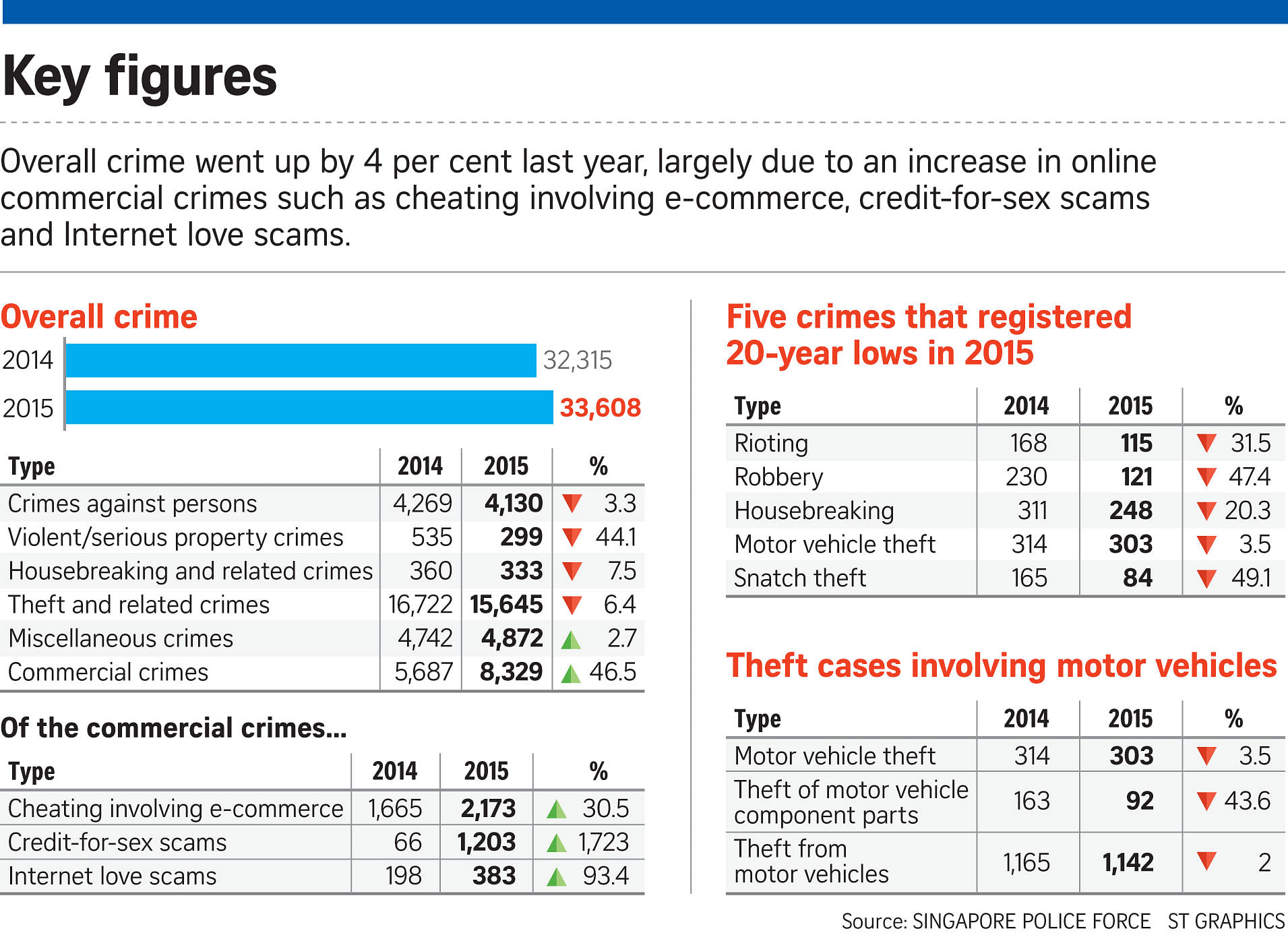A surge in online commercial offences - particularly scams offering sex for credit - has pushed up Singapore's crime rate.
Police statistics for last year, released yesterday, showed a 4 per cent rise in overall crime with 33,608 cases, although the rate remained low.
Almost all crime classes - including violent or serious property offences, housebreaking, theft and unlicensed moneylending harassment - showed a decrease.
But commercial crimes went up by about 47 per cent from 2014, with the biggest jump for cheating involving e-commerce, credit-for- sex and Internet love scams.
In 2014, there were just 66 credit- for-sex scams. Last year, there were 1,203 cases. Victims were cheated out of $2.9 million, with one losing about $74,000 - the largest amount in a single case.
Women approach men on social media asking them to buy gift cards and credits for goods online, in return for sexual services that they do not get. The victims were aged between 14 and 69.

Women were the main target of Internet love scams, cases of which rose from 198 in 2014 to 383. Victims handed over about $12 million, with around $528,000 being lost in the biggest case.
In most cases, offenders befriend their victims on social media and charm their way into their lives, then cheat them of their money. Those targeted were aged 21 to 74, and the scams were mainly carried out by foreign syndicates.
Meanwhile, e-commerce cheating cases soared by about 30 per cent last year.
Mr David Chew, director of the police's Commercial Affairs Department, said the force works closely with foreign law enforcement agencies and Interpol to crack down on foreign syndicates. He said: "Police will also investigate and prosecute local residents who are found to be perpetrating or assisting foreign syndicates in their criminal activities."
He noted that Singapore is a target due to its "wonderful infrastructure for the Internet", and urged the public to take care online.
"The reality is that we do not know who you are transacting with on the other end of the Internet," he said. "You might as well be transacting with a guy in Novena, or all the way in Nigeria, for all you know.
"People are lulled into a sense of complacency because we are safe on our streets, but they don't realise that the criminals use this sense of safety to scam us."
In December, 43 members of a syndicate were arrested in China after tricking Singaporean men into paying for sexual services that they never received. Mr Chew noted that in the following month, there was a 68 per cent dip in such scams.
"Sixty-eight per cent is quite substantial but not a complete success," he said. " There is a great deal of difficulty in intervening at every stage of the transaction. To stop the crime... it will take a bit of time, education and enforcement."
Police have warned the public of scams through roadshows, TV advertisements and a website. This has had some success, with people stopping their loved ones from sending money to suspicious operators.
Experts say victims of online love or sex scams can be lonely, or teens exploring sexual matters.
Mr Chong Ee Jay, manager of Touch Cyber Wellness, a voluntary welfare group that teaches Internet safety, said: "People think conversing online should be safe, but it's very easy for the perpetrators to hide their true intentions behind technology."
Psychologist Daniel Koh noted: "It works on instant gratification, so people are more impulsive to pay or carry on... It is also more targeted - people who seek certain websites want certain things."
Consultant psychiatrist Adrian Wang believes there could be victims who have not come forward.
"Victims of such scams are emotionally vulnerable and, to some extent, also naive and not Internet savvy. After being scammed, they are probably too embarrassed to report the crime.
"I wouldn't be surprised if the actual numbers are higher."

